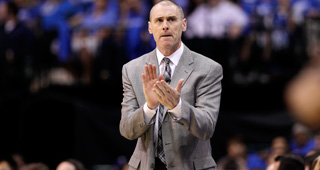The NBA offseason is a great tornadic swirl: big names are on flattery tours, imagined and actual trade possibilities abound, rosters are being rounded out and stripped for parts, draft stocks are spiking and cratering, agents are leaking half-truths about their clients to the media, coaches are losing their jobs, general managers are trying to save theirs, and in some well-appointed manse there is always a player with his head in his hands, mulling contract offers and not knowing what to do. The very moment after a champion is decided, the league dissolves into uncertainty as everyone tries to figure out how to win the thing next year, or at least put themselves on the right path. It helps, when the winds pick up and rumor and personnel go flying every which way, to have a magnetic north to guide you.
Speaking of which, the Dallas Mavericks clinched a playoff berth for the 15th time in 16 seasons on Monday night. Their 101-92 victory over the Jazz was prettier than many of the Mavs other wins as they’ve dragged themselves from three games below .500 a couple weeks ago into the Western Conference’s seventh seed. Dirk Nowitzki hasn’t shot well and Deron Williams hasn’t been playing much, which has left the team to rely on defensive solidity, the pacey-erratic stylings of rookie Justin Anderson, and J.J. Barea briefly confusing himself with Isaiah Thomas. It hasn’t been a steady rise, nor has it been entirely explicable, and it’s going to cease in the first round of the postseason, where the Mavs will meet the Spurs, Thunder, or Clippers.
This might sound like an all-things-considered minor development, and it is for a franchise that won a championship not so long ago, but not all triumphs are grand. At the season’s beginning, the Mavericks figured to be a lottery team poised to go in the tank if they struggled over the first few months. Both Wes Matthews and the now-shelved Chandler Parsons were coming off significant injuries, Williams was brought in as a reclamation project after his miserable Brooklyn stay, and the rotation was set to feature past-it vets like Zaza Pachulia and Ray Felton. There are arguments to be had about where DeAndre Jordan might have placed the Mavs in the Western Conference hierarchy, but without him, they appeared to be far from dangerous, perhaps even far from playoff contention.
Yet Rick Carlisle has made this collective work as effectively as they possibly can, sputtering as they might on nights when Dirk’s jumper isn’t falling. If this isn’t the best coaching job Carlisle has done with the Mavericks, then it’s a fine showcase of his genius, which is a kind of hyper-competent pragmatism. When Carlisle, who is a control freak par excellence, joined the Mavs in 2008, he swiftly realized that with Jason Kidd as his point guard, he didn’t need to handle the offensive playcalling responsibilities. He instead chose to establish broad principles while mostly allowing Kidd to direct traffic on a possession-to-possession basis. What resulted was a fluid, reactive offense that occasionally slowed down to Dirk space to work on the elbow—one that eventually overwhelmed the Heat in the 2011 Finals.
Kidd left the Mavs in 2012, but the gist of the scheme persisted, reaching its aesthetic apex around the time Monta Ellis signed on in 2013. Somehow, Carlisle figured out how to let Monta be expressive without lapsing into recklessness. Even if the Mavs weren’t worldbeaters during this period, they were beautiful to watch. And potent, too: they took the eventual title-winning Spurs to seven games in the first round of the 2014 playoffs.
This year, Carlisle has had to revamp his approach. The Mavs once scored at will but couldn’t stop anyone, and they’re now well-drilled in the art of outlasting opponents with grueling, conservative defense and a methodical offense that Carlisle directs from the sidelines. It’s unwieldy but functional, and functional is a high bar to clear for a squad that plays Ray Felton 27 minutes per night.
What’s instructive here for the rest of the NBA is not that Carlisle is brilliant and rivaled only by Gregg Popovich in his ability to emphasize the talents of mediocre players, but that Mark Cuban and his front office have recognized that brilliance and stuck with their head coach even through lean periods. This is no small thing: Carlisle was pushed out of Detroit in favor of Larry Brown and his Pacers tenure disintegrated shortly after the Malice at the Palace torpedoed that team. He didn’t come to Dallas with the kingly, unimpeachable reputation of a Phil Jackson or a Pat Riley. He arrived as a by-all-accounts bright coach with an assertive personality that tended to rub employers the wrong way. The Mavericks have given him space to be the difficult intellect he is.
In return, with the immense aid of one of the finest forwards to ever play the sport, Carlisle has given Dallas a title and a degree of stability many NBA franchises lack. What stability is worth depends on what you want from a basketball team, which is a matter of taste and temperament, but it’s an undeniably rare commodity in league permeated by flux, with many organizations regularly fretting over whether to reset or push forward, whether to switch styles or shift the roster around. In Dallas, there is a constant in Carlisle, who can figure out how to use whatever players the front office gives him. The Mavericks—assuredly, year after year—are never less than what they can be, and that’s special, whether they’re hoisting a trophy or squeaking into the postseason on creativity and guile. It’s not everything, but it’s a promise in this great, tornadic, volatile league.



